状语及状语从句(语法加练习完整讲解)
- 格式:ppt
- 大小:1.04 MB
- 文档页数:70
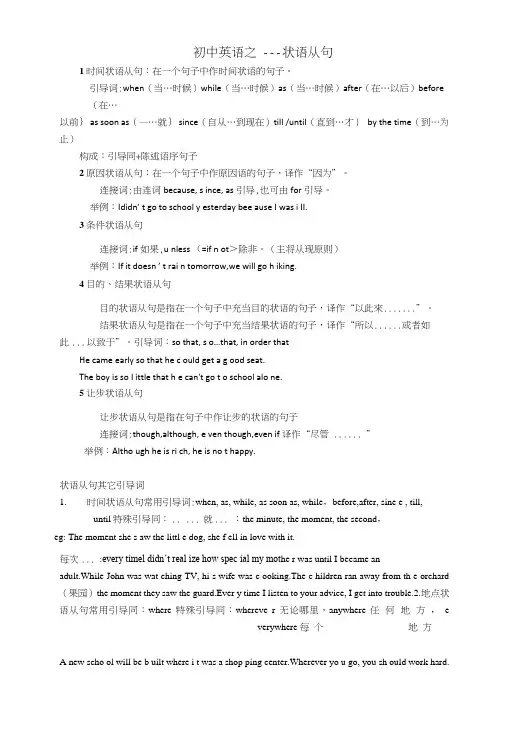
初中英语之 --- 状语从句1时间状语从句:在一个句子中作时间状语的句子。
引导词:when(当…时候)while(当…时候)as(当…时候)after(在…以后)before(在…以前} as soon as(—…就} since(自从…到现在)till /until(直到…才}by the time(到…为止)构成:引导同+陈述语序句子2原因状语从句:在一个句子中作原因语的句子,译作“因为”。
连接词:由连词because, s ince, as引导,也可由for引导。
举例:Ididn’ t go to school y esterday bee ause I was i II.3条件状语从句连接词:if如果,u nless (=if n ot>除非。
(主将从现原则)举例:If it doesn ’ t rai n tomorrow,we will go h iking.4目的、结果状语从句目的状语从句是指在一个句子中充当目的状语的句子,译作“以此來.......”。
结果状语从句是指在一个句子中充当结果状语的句子,译作“所以......或者如此... 以致于”。
引导词:so that, s o…that, in order thatHe came early so that he c ould get a g ood seat.The boy is so I ittle that h e can't go t o school alo ne.5让步状语从句让步状语从句是指在句子中作让步的状语的句子连接词:though,although, e ven though,even if 译作“尽管 ...... ”举例:Altho ugh he is ri ch, he is no t happy.状语从句其它引导词1.时间状语从句常用引导词:when, as, while, as soon as, while,before,after, sine e , till,until 特殊引导同:.. ... 就... :the minute, the moment, the second,eg: The moment she s aw the littl e dog, she f ell in love with it.每次... :every timel didn’t real ize how spec ial my mot he r was until I became anadult.While John was wat ching TV, hi s wife was c ooking.The c hildren ran away from th e orchard (果园)the moment they saw the guard.Ever y time I listen to your advice, I get into trouble.2.地点状语从句常用引导同:where特殊引导同:whereve r无论哪里,anywhere 任何地方,everywhere 每个地方A new scho ol will be b uilt where i t was a shop ping center.Wherever yo u go, you sh ould work hard.状语从句练习单项选择1.John does n't letever ybodyinthe kitchen __________ h e could makehis sur prisedinner fortheparty.A. which B. when C. so that D. as if 2.I wouldt hankit __________ you call back this a fternoon for the doctor5 smeeting.A.until B. if C. when D. that3.Asfar as Iam concerned (就我而言),education is about learning and the more you learn,—____ A. the betterlife will you get B. the betterlife you will ge tC. you will get the bet ter lifeD.will you get the bet ter life4.Af ter the war, a new school wasbuilt _____________ t here had once be en(曾经有)a theatre.A. that B. where C . which D. whe n5.—Is Mr.Smith in the office?—Yes , __________ he is in charg e of the office, he mustbe there.A.since B. how ever C. whether D. for 6.As your good friendJ will do ____________help you.A. that I can to B. what I canto C. all that I can D. what I can7.Someone called me up in the middle ofthe night, b ut they hung up(挂断电话)____________ I coul d answer the phone.A.as B.since C. until D. before8.We must hurry up __________catchup with the last train.A. that B. so that to C. in order that D. in ord er toLondon 9.No m atter ________ h ard it ma y be, I will carry it out .A. what B. whatev er C.how D. however 1 0. _________you may do, you must do itwell.A. Which B.Whenever C. What ever D.WhenM. ________ you are so weak, you’d better sta y at home.A.Since B. For C. B ecause D. Though 1 5.1saw Mr.Smith last S unday. We had not seen each other ____________ I left .A. as B. before C.since D. till 16.1’11 be back before you ________ .A.will leave B will have left C.leave D. would lea vel7.If the weather ____________ tomor row, we will go picnic i n the centra 1 park.A wil 1 be fine Bis fine Cis going to be fine D h ave been fine18. ________________________ They wen t on working it was late at night.A. eve n if B.as if C. however D. as tho ughl9.l hurr ied _____________ I wouldn't b e late for c lass.A. sine e B. sotha t C.as if D . unless20.T he volleybal I match will be put off if it __________ .A. will r ain B. rain s C. r ained D. is raining【实例解析】1.(2004年北京市海淀区中考试题)You will sta y healthy ________ you do more exerci se, such as running and walking.A.ifB. howC. beforeD. where2.(2004年江丙省中考试题)…Shall we go on wor king?Ye s, _________ I prefer to have a rest.A. whenB. ifC. be causeD. th ough3.(2004年徐州市中考试题)N one of us kn ew what had happened ___________ they told us abo ut it.A. w henB. unti IC. afterD. though4.(2004年泉州市中考试题)••-1 ho pe you’ll en joy your tri p, dear!—Thank you,mum. Til gi ve you a cal I ___________ I get there.A. untilB. as soon a sC. sinceD. till【中考演练】一.单项填空1. ______ he z s old, he c an still car ry this heav y bag.A. T houghB. Si neeC. ForD. So2.•■-Do you know if he ______ to play ba sket ball wi th us?---1 think he wi II come if h e _______ fre e tomorrow.A. comes; i sB. comes;will beC.will come;isD. will come; will b e3.In the z oo if a chil d _____ into the water a nd can't swi m, the dolph ins may come up _________ him.A. will fall; to he IpB. fall s; to helpC. will fall; help D . falls; hel ping4.1don z t remember _________ he worked in th at city when he was youn g.A. whatB. which C . where D.who5.We wil I stay at ho me if my aunt __________ to visit us t omorrow.esB. c omeC. will comeD. is coming6.Th e police ask ed the child ren _______ cross the st reet _________ the traffi c lights tur ned green.A. not; befo reB. don't; whenC. n ot to; untilD. not; af ter7.1was late for cla ss yesterday ________ t he re was somet hing wrong w ith my bike.A. when B . that C. u ntil D. bee ause8.I’ll go swimming with you if I _________ f ree tomorrow .A. will b eB. shall beC. am D . was9.In t he exam, the ________ yo u are, _______ the ________ mistakes y ou will make .A. carefu I; littleB. more ca reful; fewes tC. more c areful; fewe rD. more c a ref u I; less10.You shou Id finish yo ur lessons _______ you g o out to pal y.A. beforeB. afterC. whenD.while11.1hurried _____ I wouldn't be late for class.A.sinceB. s o thatC. a s ifD. uni ess12.When you read the book, you'd better make a mark ________ you have any questio ns.A. whi chB. thatC. where D . though13.The teacher raised his v oice ________ a ll the stu dents could hear him.A. forB. s o thatC. b ecauseD. i n order14.H e took off h is coat ________ h e felt hot.A. be causeB. asC. ifD.since15.It is ______ th at we'd like to go out f or a walk.A. a lovely dayB. t oo lovely a dayC. so lovely a dayD. such Io vely a day16 . Mary had _______ m uch w ork to do th at she staye d at her off ice all day.A. suchB.soC. tooD. very17.______ I fel t very tired , I tried to finish the work.A. AlthoughB.BecauseC.AsD. As if18.______ t he day went on, the weat her got wors e.A. WithB. SinceC. WhileD.As19.______ well you c an drive, yo u must drive carefully.A. So long asB.ln order tha tC. No ma tter how D . The momentBeijing20. Write to me as soon as you _________ to.A . will get B. get C. g etting D. g ot二.根据中文意思完成下列英语句子1.不管他跟我开什麽玩笑,我都不生气。
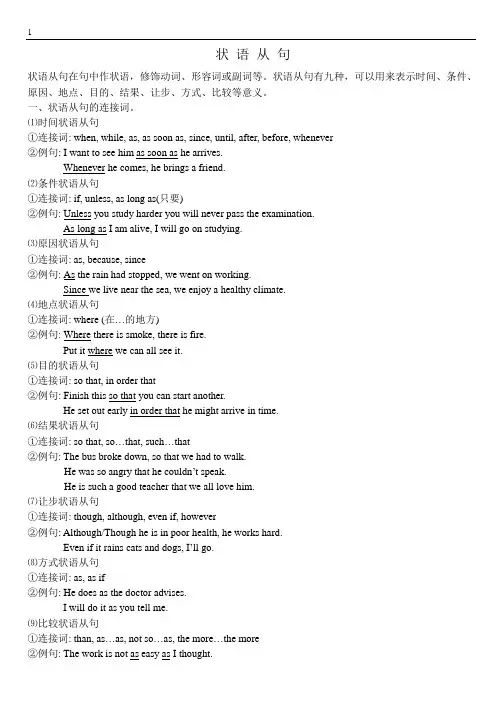
状语从句状语从句在句中作状语,修饰动词、形容词或副词等。
状语从句有九种,可以用来表示时间、条件、原因、地点、目的、结果、让步、方式、比较等意义。
一、状语从句的连接词。
⑴时间状语从句①连接词: when, while, as, as soon as, since, until, after, before, whenever②例句: I want to see him as soon as he arrives.Whenever he comes, he brings a friend.⑵条件状语从句①连接词: if, unless, as long as(只要)②例句: Unless you study harder you will never pass the examination.As long as I am alive, I will go on studying.⑶原因状语从句①连接词: as, because, since②例句: As the rain had stopped, we went on working.Since we live near the sea, we enjoy a healthy climate.⑷地点状语从句①连接词: where (在…的地方)②例句: Where there is smoke, there is fire.Put it where we can all see it.⑸目的状语从句①连接词: so that, in order that②例句: Finish this so that you can start another.He set out early in order that he might arrive in time.⑹结果状语从句①连接词: so that, so…that, such…that②例句: The bus broke down, so that we had to walk.He was so angry that he couldn’t speak.He is such a good teacher that we all love him.⑺让步状语从句①连接词: though, although, even if, however②例句: Although/Though he is in poor health, he works hard.Even if it rains cats and dogs, I’ll go.⑻方式状语从句①连接词: as, as if②例句: He does as the doctor advises.I will do it as you tell me.⑼比较状语从句①连接词: than, as…as, not so…as, the more…the more②例句: The work is not as easy as I thought.Actions speak louder than words.The more I look at the picture, the better I like it.二、易混连接词区分。
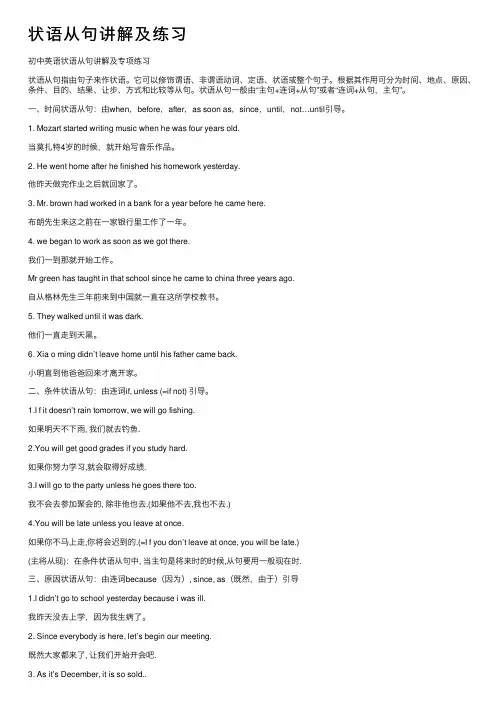
状语从句讲解及练习初中英语状语从句讲解及专项练习状语从句指由句⼦来作状语。
它可以修饰谓语、⾮谓语动词、定语、状语或整个句⼦。
根据其作⽤可分为时间、地点、原因、条件、⽬的、结果、让步、⽅式和⽐较等从句。
状语从句⼀般由“主句+连词+从句”或者“连词+从句,主句”。
⼀、时间状语从句:由when,before,after,as soon as,since,until,not…until引导。
1. Mozart started writing music when he was four years old.当莫扎特4岁的时候,就开始写⾳乐作品。
2. He went home after he finished his homework yesterday.他昨天做完作业之后就回家了。
3. Mr. brown had worked in a bank for a year before he came here.布朗先⽣来这之前在⼀家银⾏⾥⼯作了⼀年。
4. we began to work as soon as we got there.我们⼀到那就开始⼯作。
Mr green has taught in that school since he came to china three years ago.⾃从格林先⽣三年前来到中国就⼀直在这所学校教书。
5. They walked until it was dark.他们⼀直⾛到天⿊。
6. Xia o ming didn’t leave home until his father came back.⼩明直到他爸爸回来才离开家。
⼆、条件状语从句:由连词if, unless (=if not) 引导。
1.I f it doesn’t rain tomorrow, we will go fishing.如果明天不下⾬, 我们就去钓鱼.2.You will get good grades if you study hard.如果你努⼒学习,就会取得好成绩.3.I will go to the party unless he goes there too.我不会去参加聚会的, 除⾮他也去.(如果他不去,我也不去.)4.You will be late unless you leave at once.如果你不马上⾛,你将会迟到的.(=I f you don’t leave at once, you will be late.)(主将从现):在条件状语从句中, 当主句是将来时的时候,从句要⽤⼀般现在时.三、原因状语从句:由连词because(因为), since, as(既然,由于)引导1.I didn’t go to school yesterday because i was ill.我昨天没去上学,因为我⽣病了。
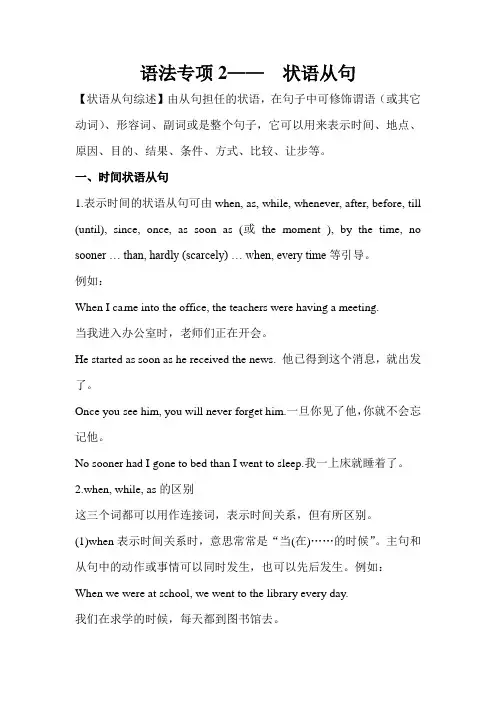
语法专项2——状语从句【状语从句综述】由从句担任的状语,在句子中可修饰谓语(或其它动词)、形容词、副词或是整个句子,它可以用来表示时间、地点、原因、目的、结果、条件、方式、比较、让步等。
一、时间状语从句1.表示时间的状语从句可由when, as, while, whenever, after, before, till (until), since, once, as soon as (或the moment ), by the time, no sooner … than, hardly (scarcely) … when, every time等引导。
例如:When I came into the office, the teachers were having a meeting.当我进入办公室时,老师们正在开会。
He started as soon as he received the news. 他已得到这个消息,就出发了。
Once you see him, you will never forget him.一旦你见了他,你就不会忘记他。
No sooner had I gone to bed than I went to sleep.我一上床就睡着了。
2.when, while, as的区别这三个词都可以用作连接词,表示时间关系,但有所区别。
(1)when表示时间关系时,意思常常是“当(在)……的时候”。
主句和从句中的动作或事情可以同时发生,也可以先后发生。
例如:When we were at school, we went to the library every day.我们在求学的时候,每天都到图书馆去。
(2)while 用作连接词表示时间关系时,意思也是“当(在)……的时候”,主句中的动作或事情在从句中的动作或事情的进展过程中发生。
它有时可与when通用,但它只能指一段时间(a period of time),而不能指一点时间的(a point of time)。
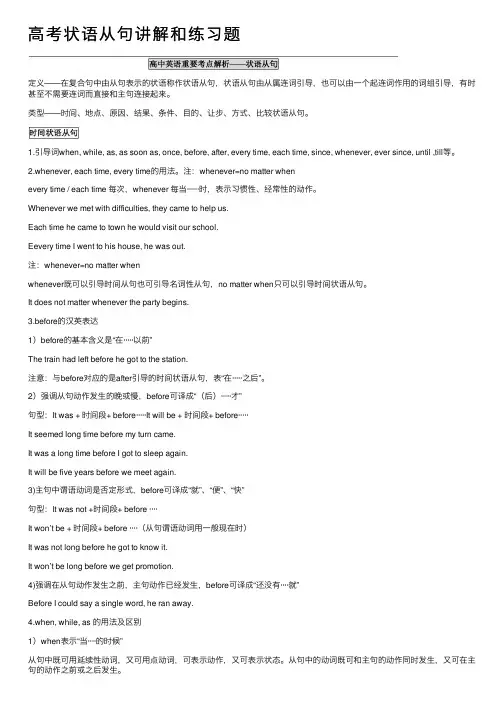
⾼考状语从句讲解和练习题定义——在复合句中由从句表⽰的状语称作状语从句,状语从句由从属连词引导,也可以由⼀个起连词作⽤的词组引导,有时甚⾄不需要连词⽽直接和主句连接起来。
类型——时间、地点、原因、结果、条件、⽬的、让步、⽅式、⽐较状语从句。
1.引导词when, while, as, as soon as, once, before, after, every time, each time, since, whenever, ever since, until ,till等。
2.whenever, each time, every time的⽤法。
注:whenever=no matter whenevery time / each time 每次,whenever 每当······时,表⽰习惯性、经常性的动作。
Whenever we met with difficulties, they came to help us.Each time he came to town he would visit our school.Eevery time I went to his house, he was out.注:whenever=no matter whenwhenever既可以引导时间从句也可引导名词性从句,no matter when只可以引导时间状语从句。
It does not matter whenever the party begins.3.before的汉英表达1)before的基本含义是“在·····以前”The train had left before he got to the station.注意:与before对应的是after引导的时间状语从句,表“在·····之后”。
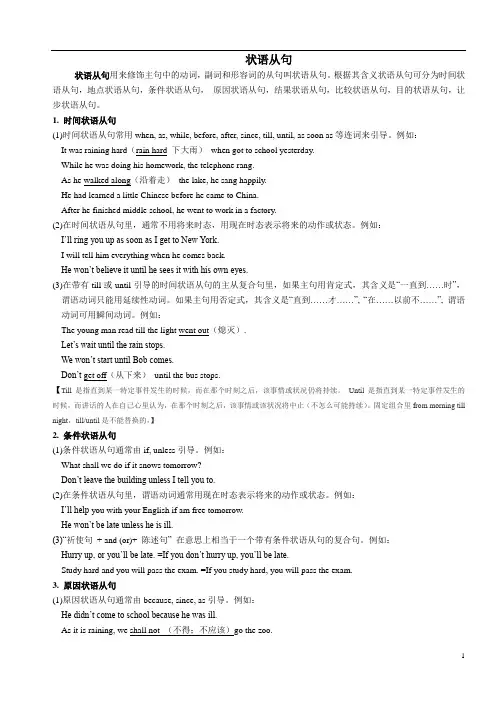
状语从句状语从句用来修饰主句中的动词,副词和形容词的从句叫状语从句。
根据其含义状语从句可分为时间状语从句,地点状语从句,条件状语从句,原因状语从句,结果状语从句,比较状语从句,目的状语从句,让步状语从句。
1. 时间状语从句(1)时间状语从句常用when, as, while, before, after, since, till, until, as soon as等连词来引导。
例如:It was raining hard(rain hard 下大雨)when got to school yesterday.While he was doing his homework, the telephone rang.As he walked along(沿着走)the lake, he sang happily.He had learned a little Chinese before he came to China.After he finished middle school, he went to work in a factory.(2)在时间状语从句里,通常不用将来时态,用现在时态表示将来的动作或状态。
例如:I’ll ring you up as soon as I get to New York.I will tell him everything when he comes back.He won’t believe it until he sees it with his own eyes.(3)在带有till或until引导的时间状语从句的主从复合句里,如果主句用肯定式,其含义是“一直到……时”,谓语动词只能用延续性动词。
如果主句用否定式,其含义是“直到……才……”, “在……以前不……”, 谓语动词可用瞬间动词。
例如:The young man read till the light went out(熄灭).Let’s wait until the rain stops.We won’t start until Bob comes.Don’t get off(从下来)until the bus stops.【Till是指直到某一特定事件发生的时候,而在那个时刻之后,该事情或状况仍将持续。
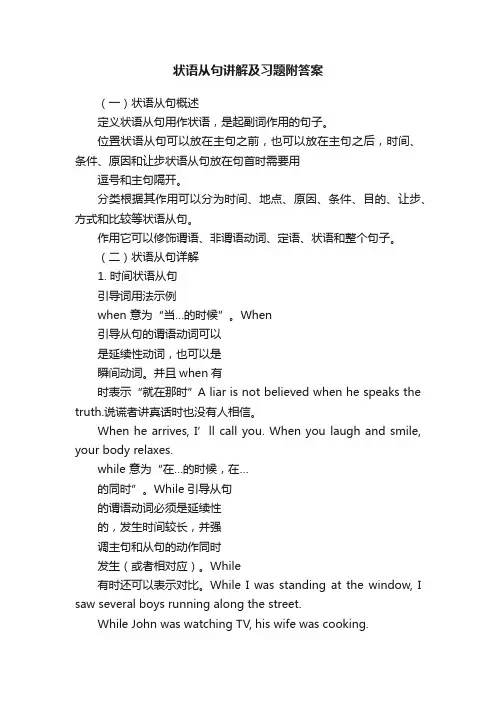
状语从句讲解及习题附答案(一)状语从句概述定义状语从句用作状语,是起副词作用的句子。
位置状语从句可以放在主句之前,也可以放在主句之后,时间、条件、原因和让步状语从句放在句首时需要用逗号和主句隔开。
分类根据其作用可以分为时间、地点、原因、条件、目的、让步、方式和比较等状语从句。
作用它可以修饰谓语、非谓语动词、定语、状语和整个句子。
(二)状语从句详解1. 时间状语从句引导词用法示例when 意为“当…的时候”。
When引导从句的谓语动词可以是延续性动词,也可以是瞬间动词。
并且when有时表示“就在那时”A liar is not believed when he speaks the truth.说谎者讲真话时也没有人相信。
When he arrives, I’ll call you. When you laugh and smile, your body relaxes.while 意为“在…的时候,在…的同时”。
While引导从句的谓语动词必须是延续性的,发生时间较长,并强调主句和从句的动作同时发生(或者相对应)。
While有时还可以表示对比。
While I was standing at the window, I saw several boys running along the street.While John was watching TV, his wife was cooking.as 意为“一边…一边…”。
As引导的动作是延续性的,发生时间较短,一般用于主句和从句动作同时发生;as也可以强调一前一后。
The writer was angry as he was travelling on a train to London because someone had invaded his “space”.He smiled as he stood up.after 意为“在…之后”。
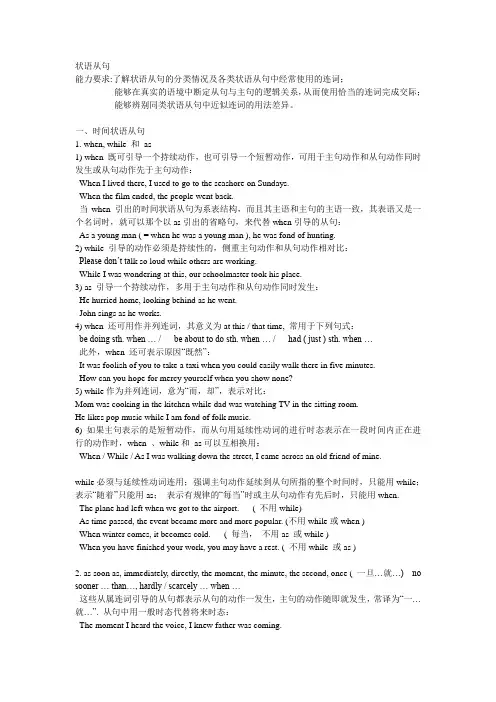
状语从句能力要求:了解状语从句的分类情况及各类状语从句中经常使用的连词;能够在真实的语境中断定从句与主句的逻辑关系,从而使用恰当的连词完成交际;能够辨别同类状语从句中近似连词的用法差异。
一、时间状语从句1. when, while 和as1) when 既可引导一个持续动作,也可引导一个短暂动作,可用于主句动作和从句动作同时发生或从句动作先于主句动作:When I lived there, I used to go to the seashore on Sundays.When the film ended, the people went back.当when 引出的时间状语从句为系表结构,而且其主语和主句的主语一致,其表语又是一个名词时,就可以那个以as引出的省略句,来代替when引导的从句:As a young man ( = when he was a young man ), he was fond of hunting.2) while 引导的动作必须是持续性的,侧重主句动作和从句动作相对比:Please don’t ta lk so loud while others are working.While I was wondering at this, our schoolmaster took his place.3) as 引导一个持续动作,多用于主句动作和从句动作同时发生:He hurried home, looking behind as he went.John sings as he works.4) when 还可用作并列连词,其意义为at this / that time, 常用于下列句式:be doing sth. when … / be about to do sth. when … / had ( just ) sth. when …此外,when 还可表示原因“既然”:It was foolish of you to take a taxi when you could easily walk there in five minutes.How can you hope for mercy yourself when you show none?5) while作为并列连词,意为“而,却”,表示对比:Mom was cooking in the kitchen while dad was watching TV in the sitting room.He likes pop music while I am fond of folk music.6) 如果主句表示的是短暂动作,而从句用延续性动词的进行时态表示在一段时间内正在进行的动作时,when 、while和as可以互相换用:When / While / As I was walking down the street, I came across an old friend of mine.while必须与延续性动词连用;强调主句动作延续到从句所指的整个时间时,只能用while;表示“随着”只能用as;表示有规律的“每当”时或主从句动作有先后时,只能用when.The plane had left when we got to the airport. ( 不用while)As time passed, the event became more and more popular. (不用while或when )When winter comes, it becomes cold. ( 每当,不用as 或while )When you have finished your work, you may have a rest. ( 不用while 或as )2. as soon as, immediately, directly, the moment, the minute, the second, once ( 一旦…就…) no sooner … than…, hardly / scarcely … when …这些从属连词引导的从句都表示从句的动作一发生,主句的动作随即就发生,常译为“一…就…”. 从句中用一般时态代替将来时态:The moment I heard the voice, I knew father was coming.The boy burst into tears immediately he saw his mother.Once you remember it, you will never forget it.No sooner had we arrived at the station than the train left.最后三个句式中,no sooner与hardly / scarcely 引导的主句谓语动词要用过去完成时,而than 与when的从句中要用一般过去时,此外,当把no sooner与hardly / scarcely提到句首时,应用倒装语序:I had hardly got home when it began to rain. = Hardly had I got home when it began to rain. On + v-ing ( hearing, seeing, returning等) 或n.( arrival, return等) 也等于as soon as.3. till, until 和not … until1) 肯定句:主句谓语动词必须是延续性动词,主句、从句都为肯定式,意为“某动作一直延续到某点时间才停止”:He remained there until / till she arrived.You may stay here until the rain stops.2) 否定句:主句谓语动词必须是非延续性动词,从句肯定式,意为“某动作知道某时间才开始”。
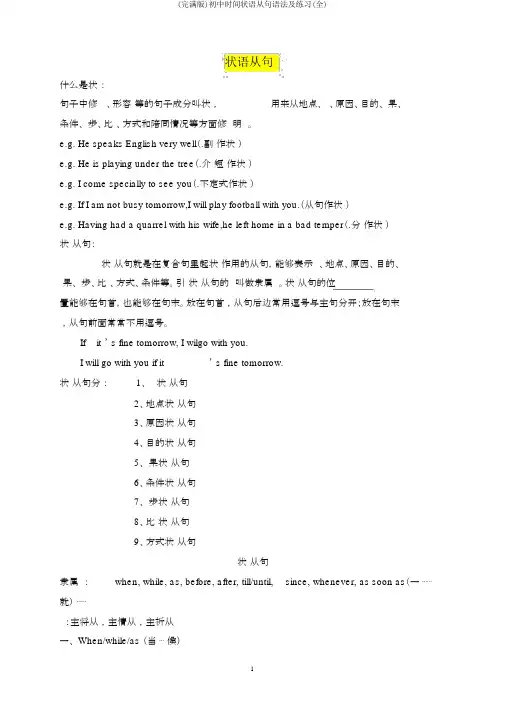
状语从句什么是状:句子中修、形容等的句子成分叫状,用来从地点、、原因、目的、果、条件、步、比、方式和陪同情况等方面修明。
e.g. He speaks English very well(.副作状)e.g. He is playing under the tree(.介短作状)e.g. I come specially to see you(.不定式作状)e.g. If I am not busy tomorrow,I will play football with you.(从句作状)e.g. Having had a quarrel with his wife,he left home in a bad temper(.分作状)状从句:状从句就是在复合句里起状作用的从句,能够表示、地点、原因、目的、果、步、比、方式、条件等。
引状从句的叫做隶属。
状从句的位置能够在句首,也能够在句末。
放在句首,从句后边常用逗号与主句分开;放在句末,从句前面常常不用逗号。
If it ’ s fine tomorrow, I wilgo with you.I will go with you if it’ s fine tomorrow.状从句分:1、状从句2、地点状从句3、原因状从句4、目的状从句5、果状从句6、条件状从句7、步状从句8、比状从句9、方式状从句状从句隶属:when, while, as, before, after, till/until, since, whenever, as soon as(一⋯⋯就)⋯⋯:主将从,主情从,主祈从一、 When/while/as (当⋯候)区:主句作与从句作生的(同/以前 /此后);从句(延性 /瞬性)1)When:when 引状从句表示“当⋯⋯ 的候”,when既能够指段也可指点,从句中既可用延性又可用瞬性,且作既可和主句的作同生又可在主句的作以前或此后生。
且when 引的状从句中一般用一般在表将来(主将从)。

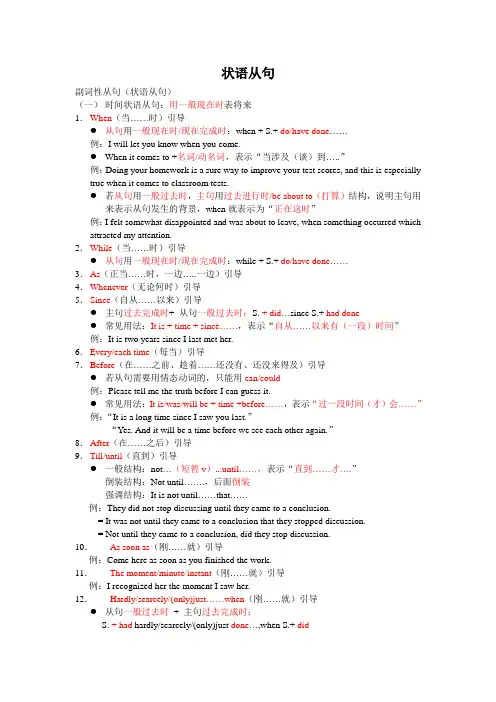
状语从句副词性从句(状语从句)(一)时间状语从句:用一般现在时表将来1.When(当……时)引导●从句用一般现在时/现在完成时:when + S.+ do/have done……例:I will let you know when you come.●When it comes to +名词/动名词,表示“当涉及(谈)到…..”例:Doing your homework is a sure way to improve your test scores, and this is especially true when it comes to classroom tests.●若从句用一般过去时,主句用过去进行时/be about to(打算)结构,说明主句用来表示从句发生的背景,when就表示为“正在这时”例:I felt somewhat disappointed and was about to leave, when something occurred which attracted my attention.2.While(当……时)引导●从句用一般现在时/现在完成时:while + S.+ do/have done……3.As(正当……时,一边…..一边)引导4.Whenever(无论何时)引导5.Since(自从……以来)引导●主句过去完成时+ 从句一般过去时:S. + did…since S.+ had done●常见用法:It is + time + since……,表示“自从……以来有(一段)时间”例:It is two years since I last met her.6.Every/each time(每当)引导7.Before(在……之前、趁着……还没有、还没来得及)引导●若从句需要用情态动词的,只能用can/could例:Please tell me the truth before I can guess it.●常见用法:It is/was/will be + time +before……,表示“过一段时间(才)会……”例:“It is a long time since I saw you last.”“Yes. And it will be a time before we see each other again.”8.After(在……之后)引导9.Till/until(直到)引导●一般结构:not…(短暂v)...until……,表示“直到……才….”倒装结构:Not until…….,后面倒装强调结构:It is not until……that……例:They did not stop discussing until they came to a conclusion.= It was not until they came to a conclusion that they stopped discussion.= Not until they came to a conclusion, did they stop discussion.10.As soon as(刚……就)引导例:Come here as soon as you finished the work.11.The moment/minute/instant(刚……就)引导例:I recognized her the moment I saw her.12.Hardly/scarcely/(only)just……when(刚……就)引导●从句一般过去时+ 主句过去完成时:S. + had hardly/scarcely/(only)just done…,when S.+ did●若hardly/scarcely/(only)just置于句首,主句须倒装(had+ S.+ done)例:He had hardly left school when it began to rain.=Hardly had he left school when it began to rain.13.No sooner……than(刚……就)引导●从句一般过去时+ 主句过去完成时:S. + had no sooner done…, than S.+ did●若no sooner置于句首,主句须倒装(had+ S.+ done)例:We had no sooner reached the top of hill than we all sat down to rest.=No sooner had we reached the top of hill than we all sat down to rest.(二)地点状语从句1.Where(在……地方)引导:从句用一般现在时例:Where there is smoke, there is fire.2.Wherever(无论在哪里)引导例:Wherever he may be, he will be welcome.(三)条件状语从句:用一般现在时表将来1.If(如果、假如)引导:用虚拟语气●if引导得从句中,若有were, had, should三词,可以省略if,并且倒装(谓语置前)例:If I had known about it, I would have told you.= Had I known about it, I would have told you.●If从句+主句= 祈使句/省略句+ and +…….例:If you give me some food, I won’t die of starvation(饥饿).= Some food and I won’t die of starvation;2.Suppose/supposing(假设)引导例:Suppose we cannot get the necessary equipment(设备), what shall we do? 3.Unless(除非、如果不)引导●Unless从句+主句= 祈使句/省略句+ or +…….例:Unless you give me another drink, I will die of thirst.= Another drink or I will die of thirst.4.As/so long as(只要)引导例:We can surely overcome these difficulties so long as we are closely united.5.If only/only if(只要)引导例:We can surely get gains, if only we work hard.6.In case/lest(万一)例:You should take good care of your kid, in case they are ill.7.Provided/Providing/Given that(假如)引导例:We will let you use the room provided that you keep it clean and tidy.8.On condition that(假如)引导(四)原因状语从句1.Because(因为)引导●表示“直接、唯一的原因”,通常放在句后,可以与not, but, only连用例:He was angry not because we were late but because we made a noise.2.As(因为)引导●表示“显而易见或大家都知道的原因”,语气较弱例:Everyone likes you as you are both kind and honest.3.Since(因为、既然)引导●表示“间接或附带的原因”,通常放在句首例:Since she insists, you must come.4.Now/seeing that(既然)引导例:Now/Seeing that you are all here, let’s try and reach a decision.5.Considering that (考虑到)引导例:Considering that he began learning English only a year ago, he speaks very well. 6.In that(由于、因为)引导例:He was late in that he didn’t catch the first bus.(五)让步状语从句1.Though/although/as(虽然)引导●Though/although…..yet连用,表示“虽然…..但是……”例:Though/although we cannot see air, (yet) it exists everyone.●as引导得从句置于句首,且倒装(表语、状语、动词置于as前)表语倒装:可以省略冠词例:Tried as I was, I stayed up late studying last night.Children as he is, he knows a lot of English.状语倒装:Fast as he read, you can’t finish novel in three days.谓语动词倒装:Try as he would, he couldn’t lift the rock.2.Even if/though(即使)引导例:Nobody lost his patience as though the meeting was long and boring. 3.However/no matter how(无论如何/怎样)引导例:We’ll continue to work, no matter how/however hot it is.4.Whatever/no matter what(无论什么)引导例:Whatever/no matter what r you may do, do your best.5.Whoever/no matter who(无论谁)引导例:Whoever/no matter who all cannot break the rules, we must keep the law. 6.Whether……or/no matter whether…..or….(不管……还是)引导例:Whether/no matter whether you can do or cannot do, you must try it. 7.Whether or not/whether……or not(不管是否……)引导例:Whether or not we had a baby, we couldn’t survive only on my salary.= Whether we had a baby or not, we couldn’t survive only my salary.(六)方式状语从句1.As(如,按照)引导例:When in Roma do as the Romans do.2.Just as(正如)引导例:Most plants need air just as they need water.3.As if/though(好像,仿佛)引导●引导的从句常用虚拟语气,除了叙述的情况实现的可能性较大例:He speaks English as if/though he were an Englishman.例:It looks as if/though the coming autumn harvest will be even better than the last one. (七)目的状语从句1.So that(以便、为了)引导●从句中谓语部分可以用can/could,may/might例:I will give you my phone number, so that you can call me when you arrive here. 2.In order to(以便、为了)引导●从句中谓语部分只能用may/might例:We should do our utmost最大可能in order that we may be able to overfulfil 超额完成the task.3.For fear that/lest(以免、以防)引导●从句用虚拟语气“should +V.”例:Batteries 电池must be kept in dry place for fear that/lest electricity should leak 渗漏away.4.In case(以免、以防)引导●从句中谓语部分不用虚拟语气例:Better take more clothes in case the weather is cold.(八)结果状语从1.that(因而)引导例:What’s the matter that they still haven’t answered our e-mail?2.so that(因而)引导●主句,+ so that,且从句中谓语部分只能用may/might例:The temperature is increased , so that the volume of the gas can become greater. 3.So…..that(如此……以至)引导●so +形容词/副词+a/an+名词+ that例:It is so hot a day that we cannot sleep.●so置于句首时,需倒装状语例:So fast did he run that I could not keep up with him●so + much/little/few/many + that,而不用such…..that例:She has so little education that she is unable to get a job.4.Such…..that(如此……以至)引导●Such +名词(可数的单数名词)+ that例:It is such a lovely day that everybody is feeling happy and gay.(九)比较状语从句1.Than(比……)引导例:There are more vocabularies in this unit than in that one.2.As……as(如……一样)引导●As +形容词/副词+a/an+名词+ as + 省略句例:He is as clever a boy as his brother.例:This book is nearly as thick as that one(is).3.Not so……as(不如……一样)引导●As +形容词/副词+a/an+名词+ as + 省略句例:You are not as tall as she.4.The+比较级,the+比较级(越……越…….)引导例:The hotter that air becomes, the lighter it gets.例题1、()______ your daughter has not come back , let me take you to the Friendship Hospital.A WhenB SinceC ThatD For2、()______ Tom is not feeling well today , he has to stay at home.A ThoughB ForC FindingD As3、()They are ______ hard-working students that they have already made ______ much progress since thay came here.A so ; soB such ; suchC so ; suchD such ; so4、()______ we have finished the book we shall start doing some exercises.A For nowB Since nowC Now thatD Since now5、()He asked us not to be noisy ______ we should wake the baby.A in cseB in the caseC in case ofD in this case巩固练习1、()______ you are familiar with the auther`s ideas , by reading all the sections as quickly as you can.A Ever sinceB As long asC So thatD Now that2、()The boy has to learn ______ things that he hardly has time for play.A so manyB such manyC so fewD such few3、()In the old days the poor worker worked long hours every day ______ he could support his whole family.A becauseB thoughC unlessD so that4、()Tell him that I will call him back , ______ he gives me a call.A in most casesB in caseC in any caseD in case of5、()______ you have reminded me , I will try to be a teacher.A Now thenB So thatC Now thatD In order that6、()You will have to study for many years ______ you may become a brain surgeon.A in order thatB in thatC althoughD soKey 1~5 BDDCA 1~6 DADBCA二、习题1、()It is almost impossible to become skilful in speaking a language ______ you use it constantly.A but forB if onlyC exceptD unless2、()Everything will be all right ______ Tom is left to do the work in his own way.A as far asB mean whileC so long asD in case3、()Do remind me of the date again tomorrow ______ I forget.A in caseB except thatC even ifD as though4、()You must do the experiment ______ the teacher told you.A asB sinceC so thatD unless5、()I could not resist having another piece of cake even ______ I was supposed to lose weight.A althoughB howeverC otherwiseD though6、()______ I suggest , he always disagree.A WhatB HowC WhateverD How a7、()However ______ you hate them , you must work with them.A very muchB too muchC much tooD much8、()Try ______ he might , Tom could not get out of the trouble.A as ifB altoughC ifD as9、()______ whales are very large , they are no longer an even match for man.A SinceB BecauseC Now thatD Although10、()Man must have food just ______ plants must have sunlight.A forB likeC becauseD as巩固练习1、()______ I know , the visitors are all satisfied with the arrangement in the next few days.A As far asB As long asC As well asD As soon as2、()______ convincing an argument is , it needs support of evidence.A No matterB ThoughC HoweverD As3、()Anyone can borrow books from the library ______ he has a library card.A so long asB sinceC even thoughD unless4、()______ much advice I gave him , he did exactly what he wanted to do.A HowB WhateverC WhatD No matter how5、()Remember , science requires your whole life ______ you had two lives to give , they would not be enough.A AlthoughB ThoughC If onlyD Even if6、()I am sure that Laura`s latest play , ______ staged , will prove a great success.A sinceB unlessC onceD until7、()Send us a message , ______ you have any difficulty.A in case thatB in caseC whileD as8、()Electricity flows through a wire ______ water flows through a pipe.A whileB just asC much asD whenever9、()Food shortage will long be a world problem ______ much has been done to supply enough for everyone.A althoughB evenC no matterD since10、()I do not like the city , ______ though I have been living here for more than ten years.A evenB asC everD butkey1~5 DCAAD 6~10 CDDDD 1~5 ACADD 6~10 CBBAA。
状语从句(Adverbial Clause)状语从句指句子用作状语时,起副词作用的句子。
它可以修饰谓语、非谓语动词、定语、状语或整个句子。
根据其作用可分为时间、地点、原因、条件、目的、结果、让步、方式和比较等从句。
状语从句一般由连词(从属连词)引导,也可以由词组引起。
从句位于句首或句中时通常用逗号与主句隔开,位于句尾时可以不用逗号隔开。
状语从句的种类状语从句可分为:1.时间状语从句;(adverbial clause of time)2.地点状语从句;(adverbial clause of place)3.原因状语从句;(adverbial clause of cause)4.条件状语从句;(adverbial clause of condition)5.目的状语从句;(adverbial clause of purpose)6.让步状语从句;(adverbial clause of concession)7.比较状语从句;(adverbial clause of comparison)8.方式状语从句;(adverbial clause of manner)9.结果状语从句。
(adverbial clause of result)[编辑本段]状语从句的时态特点一般情况下,时间和条件状语从句的谓语动词一般用“一般现在时”表示“一般将来时”,用“现在完成时”表示“将来完成时”。
例如:I will call you as soon as I arrive in Beijing. 我一到北京就给你打电话。
(这是由as soon as引导的时间状语从句,从句中的谓语动词arrive是一般现在时,表示一般将来时,决不可用will arrive)As soon as I have finished this work, I will go home. 我一完成此工作,就回家。
(从句中的谓语动词用现在完成时have finished,表示将来完成时,决不可用will have finished)If he comes back, please let me know.如果他回来了,请通知我。
中考英语复习——状语从句讲解及练习状语(1) 说明动作“何时”、“何地”、“如何”发生,或者说明形容词或副词的程度,一般由副词、介词短语、不定式、状语从句等充当。
如:I was not born yesterday.(我又不是昨天才出世的娃娃。
)/ For many of these families a college education was something new.(对其中的许多家庭来说,大学教育是件新事物。
)/ He woke up to find his house on fire.(他醒来发现房子着火了。
) / You cannot leave until your work is finished.(在你的工作被完成以前你不能离开)(2) 副词作状语位置较为灵活,;介词短语作状语,位置基本固定,;不定式作状语,一般表示目的、结果,;从句作状语(3) 多个状语相连时,一般先单词、后短语,先地点、后时间,先小概念、后大概念。
如:He went ouf of the room at a quarter to 23:00 last night and thendisappeared into the dark.(他昨夜22点3刻从房间里出来,然后消失在黑暗之中。
) /(4) 状语还可以用从句来充当,有时间状语从句、地点状语从句、原因状语从句、目的状语从句、结果状语从句、比较状语从句、让步状语从句、条件状语从句等。
详见“状语从句”。
(5) 注意:由于状语属于修饰性的成分,常归入谓语,因此不作为句子的主要成分。
1 时间状语从句:在一个句子中作时间状语的句子。
时间状语的连接词:when(当…时候) while(当…时候) as(当…时候)after(在…以后) before(在…以前) as soon as(一…就) since(自从…到现在) till/until(直到…才) by the time(到…为止)依旧是连接词后加陈述语序。
宾语从句、定语从句、状语从句一状语从句1. 时间状语从句在句中相当于时间状语的从句叫时间状语从句, 常由as soon as, when, while, as, after, before, since, ever since, until, every time, each time, next time等引导。
As soon as you arrive, give me a phone call. 你一到就给我来电话.Mary was reading when I left. 我走的时候玛丽正在读书.While I played the piano, sister did her homework. 我在谈钢琴,姐姐在做功课.You can’t leave until you go through with your work. 不完成这项工作你不能走。
注意: 1. 用until引导时间状语从句时, 主句应用可持续性动词,如果主句是非持续性动词,则主句用否定形式.如:I won’t go until you come back. 你回来了我再走.2. 在时间状语从句中,常用一般现在时表示一般将来时, 用一般过去时表示过去将来时. 如:Don’t forget to bring your DV4000 camera here when you come. 你来的时候别忘了带DV4000摄像机.3. 在由since 引导的时间状语从句中,主句用现在完成时,从句用一般过去时. 也可用“It is + 一段时间 + since (引导一般过去时的从句)”句型. 如:He has worked in that company since he graduated from Wuhan University. 他毕业以来就一直在那个公司工作.2.地点状语从句在句中相当于地点状语的从句叫地点状语从句.引导地点状语从句的常用词有 where, anywhere, somewhere等. Make marks where you have questions. 在有问题的地方作出标记.You can go anywhere you like. 你可以到你想去的任何地方.Where there is a will, there is a way. 有志者事竟成.3. 原因状语从句在句中相当于原因状语的从句叫原因状语从句. 引导原因状语从句的常用词有because, as, since, for 等. Roman was absent from school because he was ill. 罗曼病了, 没有上学.As Parker was in a hurry, he left this bag home. 由于派克太匆忙才把包丢家里了.Since everyone makes mistakes, you shouldn’t always criticize him. 既然每个人都会犯错误, 你不该总是批评他。
状语从句⽤法讲解和练习状语从句专题⼀.状语从句从句种类主要从属连词1时间状语从句 when, while, as, before, after, until, till, whenever 2条件状语从句 if, unless3⽬的状语从句 in order that, so that4结果状语从句 so…that, such…that, so that, so5原因状语从句 because, as, since6让步状语从句 although, though, even though(if), while7⽅式状语从句 as if, as though8地点状语从句 where, wherever9⽐较状语从句 than, as★时间状语从句when(当……的时候),while(当……的时候),as(当……的时候),once( ⼀旦),till( until)(⼀直到……,直到……才),by the time(到……时),as soon as(⼀……就)the moment(⼀……就).since(⾃从……).before(在……前).after(左……后)3.2.when,while,as均可表⽰“当……的时候”。
when强调“特定时间”,表⽰主句谓语动词的动作与从句谓语动词的动作是同时发⽣的,或从句的动作发⽣在主句的动作之前;while表⽰的时间是⼀段,⽽不是⼀点,as多⽤在⼝语中,强调“同⼀时间”或“⼀前⼀后”,有时还有“随着”的含义。
I'll go on with the work when/come back tomorrow.我明天回来后会继续做我的⼯作。
When spring came, he felt like a trip.春天来了,他想去旅游。
As spring warms the good earth,all flowers begin to bloom.(as有“随着”的含义)3.3.till/until,表⽰“⼀直到……”,主从句都⽤肯定式;表⽰“直到……才”,主句否定,从句肯定。